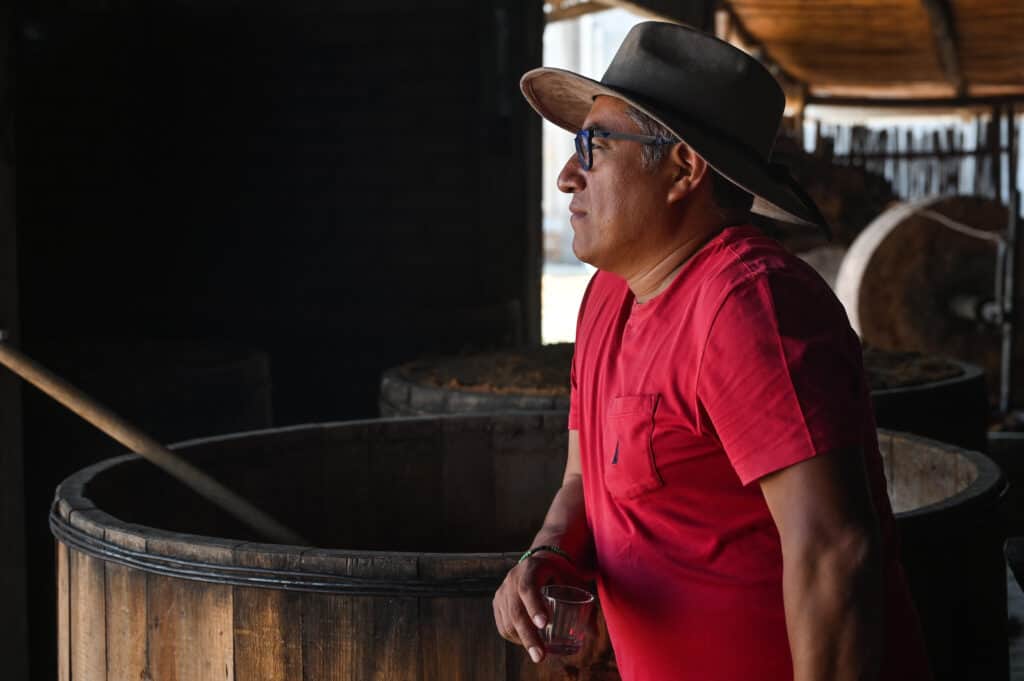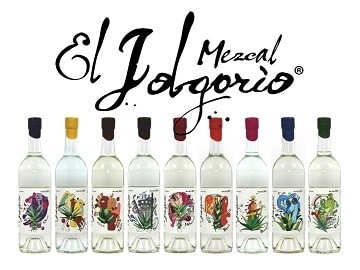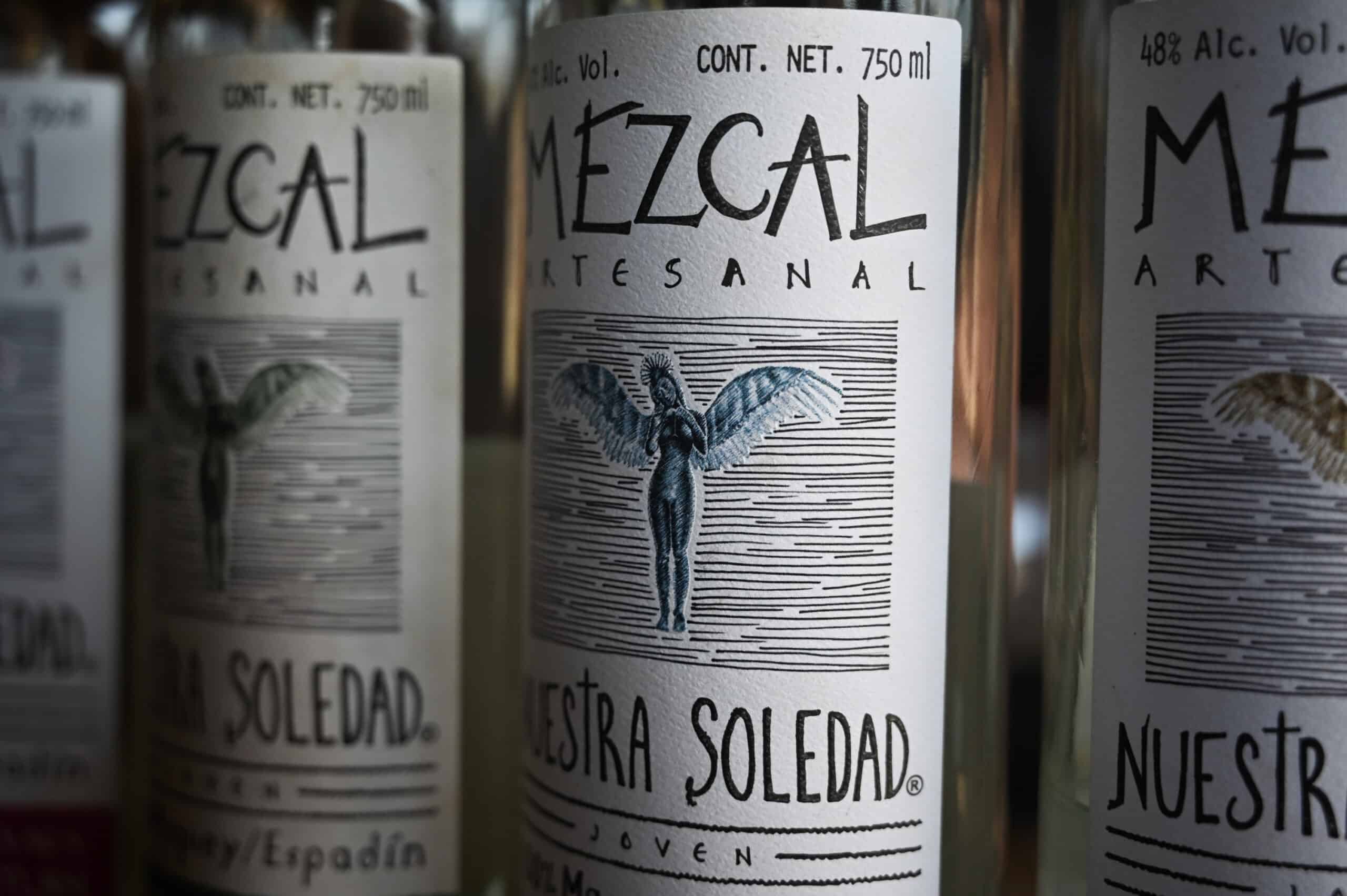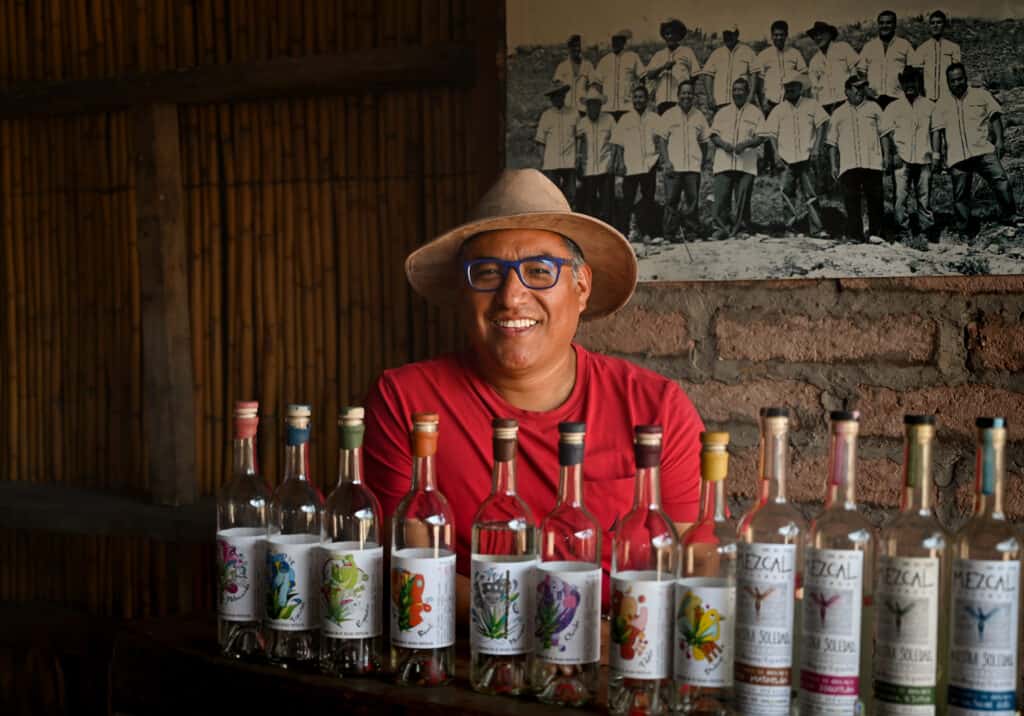We arrived early to the Cortes palenque in Santiago Matatlan. The entrance is off a dusty road, left of the highway as you drive through the town, away from Oaxaca City. I was excited, even a little nervous, to finally meet Rolando Cortes Hernandez, CEO of Casa Cortes, and youngest son of Jose and Crispina Cortes. I was aware of his busy schedule, so I’d anticipated an introduction, or a short interview at best. However, he couldn’t have been more open and welcoming, sharing stories from his past, plans for the future and of course a generous selection of the Casa Cortes range. A few morning mezcals definitely help get the conversation flowing…
Rolando’s family has been producing mezcal for five generations, since 1840, and their influence was enhanced by the launch of Casa Cortes in 2007. Roland co-founded this initiative with his family to preserve traditions of mezcal production, while inviting various producers to a platform that supports economic growth. Casa Cortes incorporates a range of mezcals defined by three brands; Agave de Cortes, El Jolgorio, and Nuestra Soledad. Of all the new labels that have emerged over the past decade and a half, these three have really made their mark.
Rolando grew up in the town of Santiago Matatlan, in the Central Valleys of Oaxaca. Rich in tradition and frequent celebration, this is a community that has long been known for mezcal production, and in fact bills itself as the “Mezcal Capital of the World.” Family customs are integral to this legacy, with it being common practice for skills to be passed down from father to son, mother to daughter. The area became known for mezcal in the 1960s when there was a shift from selling the spirit locally to a ramp up in production, selling to visitors and other communities. This led to an increasing use of espadin agave in the area, due to relative ease of cultivation, short growth cycle and high sugar content.
In the late 1970s, there was a crack-down on mezcal production in the central valleys of Oaxaca. Inspectors came to palenques with permits and tax assessments. If you couldn’t pay, they would destroy the production, pouring oil into the vats, taking knives to tanks, pouring away tepache. Rolando remembers, “My dad would arrive with so much sadness, telling my mom about how they threw away all the mezcal.”
This was a blow to the mezcal producers and triggered a significant migration to the United States. According to Rolando, they left because they could no longer work, and this situation continued until the late eighties, with many people leaving, including his brothers. Rolando was the youngest son, so he stayed home. He remembers playing under the table, listening to his parents and the struggle they were going through. At this young age he knew he wanted to work with mezcal as he hoped it would bring his brothers home and unite the family.

The birth of Casa Cortes
In 2006, he developed the first brand: Agave Cortes. Rolando described how the use of the word agave was influenced by the tequila market, because at the time there was little use of the word maguey. The pentagon on the label represents the family Cortes, and the use of the two initials of Agave Cortes, A and C, represent the pillars of the family; mother and father.
For several years, sales were low. Selling at fairs alongside sweet cremas de mezcal, they were not reaching their desired audience. Rolando felt pressure to take their mezcal in that direction, but he was adamant that he didn’t want to adulterate the pure spirit he was working with.
In 2009, Rolando found an opportunity to meet with a friend from the Secretaría de Agricultura y Agropecuaria y Desarrollo Rural (AGARPA) in Oaxaca named Edgar Guzman Corrales who invited Rolando to join the beginning of a group called the Sistema Producto Maguey Mezcal, an organization to support mezcal producers. He was in fact offered the presidential role, although in the end he took a vice-presidential role in the project. During his participation he helped attain over 20 million pesos to support mezcal producers. Although their intentions were positive, the bureaucracy became complicated and politicized, and Rolando chose to retire from his position.
Through this experience, Rolando met some key players in the mezcal industry, including Jaime Muñoz of Danzantes and Graciela Angeles from Real Minero. As part of a group they visited Mexico City where a museum of tequila was being built in Plaza Garibaldi. Together they petitioned for mezcal to be included in the concept, and to this day you can visit the Museo del Tequila y del Mezcal.
The group went out for drinks to celebrate their success. Rolando was overwhelmed by seeing the variety of agave expressions on the menu at the restaurant, which included bottles from Real Minero. He says that up to this point he had not absorbed that mezcal had such a presence and unique style in other parts of Oaxaca. This was a pivotal moment, when he found his passion for the nuances of agave and mezcal.
Expanding the Casa Cortes line
The next brand he created was El Jolgorio, in 2010. The name translates to “revelry,” and is possibly the best known of the Casa Cortes stable. Following his experience in Mexico City, Rolando was inspired to pursue a connection with Ignacio Parada in Zoquitlan to begin this new venture with a variety of different wild agave expressions. This project later expanded, becoming the inclusive producer-centric brand we know today.
The El Jolgorio label is a beautiful and perfect example of artisanal mezcal packaging. An artist from CDMX, Alejandro Peña, worked with the design team at Cuarto Rojo to create the artwork and theme for the iconic labels known today. In 2013, Rolando’s nephew Asis Cortes joined the design team at Casa Cortes and developed the labels for the El Jolgorio Arroqueño, Jabalí, Tobasiche, Cenizo and Coyote. Additionally, Asis designed the artwork for the Nuestra Soledad brand.
The vision for the name and logo of Nuestra Soledad is that the Virgin is always with you: “Mezcal always accompanies you through thick and thin.” But the concept for the different varieties is to represent the people and terroir of Oaxaca. There is a long-standing tradition of working with only espadin, so here the idea is to use that agave, and discover how the different regional expressions influence flavor and experience. In light of recent concerns over the exploitation of wild agaves, the focus on espadin is also with the aim to take the pressure off that market.


Rolando feels a deep connection to his family and a responsibility toward the people who molded him. “I hear the things they taught me and feel them guide me in my decisions.” From his father he credits his work ethic, honesty, and trust. His mother created a deep family bond and inspired in him a passion for tradition and history. One of his most poignant memories about his parents is their support of each other and clear aspirations. He recounts a story of when his father was planning to make the leap from apprentice mezcalero to building his own palenque. Through the fear of risk to the family he looked to his wife who told him, “This is your dream, you have to do it. I believe in you.” When Rolando began to pursue his own dreams in earnest, his father passed on this singular message. “I believe in you.”
Since 2021 there are some specific developments built into the initiative. One key focus is to highlight women in the mezcal world. Rolando’s niece Monica is now the face of Casa Cortes, ambassador for all three brands. She describes mezcal production as a family effort that includes women; “it is important that we recognize this contribution, which has always been a part of mezcal history. My grandmother (Crispina) has always been a good example of that. She was a woman ahead of her time.”
Casa Cortes recently brought on their first female mezcal producer, Maestra Mezcalera Justina Ruiz Perez from Sola de Vega, who distills coyote agave in clay pots. Although a mezcal from this region has been in the works for a long time, it took Justina stepping up to join Rolando for a drink that changed the tide. “She came up to me and said in a bombastic voice, If my husband doesn’t want to drink, I’ll go with you.” Rolando describes her as a wonderful woman, who is keen to welcome you into the family palenque with laughter and a mezcal.
There are also plans to bring on two more mezcaleras in the coming months.
Pechuga as the intersection of faith, family and tradition
Although Rolando grew up in the Catholic tradition, he does not consider himself 100% Catholic, as he does not attend regular mass ceremonies as his mother did. She was devout. She would wake at six every morning, and her first act was to attend to the altar, cross herself, and say grace. She told her son that even if he could not attend mass or did not have an altar, that gratitude is the most important thing in life. “So, as you wake up, thank God for waking up and to be taken care of all day.”
Rolando’s mother recently passed away, but her presence is still deeply felt. He was tearful as he described her, but clearly joyful as he tapped into his memories. The first mezcal he offered us when we arrived at the palenque was their pechuga. He said this mezcal evokes thoughts of his mother. Pechuga is made during sacred days, days of gratitude, a mezcal that represents gratitude. “Mezcal de pechuga is something that comes from the heart, from the bosom of a family.”
What is pechuga? Pechuga is made with seasonal fruits, often using spices and other elements from the altar. A turkey breast (pechuga) is suspended in the top of the alambique, not touching the liquid, but acting as a filter for oils that could burn off from the elements added with the alcohol. Symbolically the use of the pechuga is a sacrifice and an offering, which relates this practice back to pre-hispanic times, when sacrifices were made to give thanks. Rolando remembers sacrificing the turkey with his mother, plucking it, the fathers carpeting the floor beneath their feet. A significant moment. A ritual.
It was an honor that Rolando invited us in with this spirit. It is quite a recent development in mezcal to have access to these pechugas, as they were typically saved for the family and it took some persuasion for Rolando to convince his parents that he could share theirs with the public. Finally he convinced them to make a batch, but rather than sell it they were making it to share, in honor of the Virgen de los Remedios. Of course this was just the beginning of what is now a very popular expression for Casa Cortes.
Most people in Matatlan are Catholic, and their faith is traced back to the Virgin de Remedies, patron saint of the town. The Virgen de Remedios was the first religious image venerated, from the time of the Conquest of Mexico-Tenochtitlan. She was invoked as “patron saint of rains and storms.” As the youngest of seven, Rolando was the one who stayed home longest, growing up with his mother. Because she was so devout, he feels he is the one of his siblings most rooted in Catholic tradition. There is a big celebration that takes place on September 8th to celebrate the Virgen, so this first batch of pechuga was made for this event. This first batch was made in around 2012. Since then they have made a batch every September. In 2018, they began making a special pechuga for Semana Santa, and now they make a special edition Christmas Pechuga as well.
There are many rituals that are still respected in Matatlan. These correspond to the Zapotec culture that was dominant before the Spanish conquest. For example the 7 OM bell ringing is a signal that another day is over and to give thanks. If you are near another person you wish them well. If you enter a house in Matatlan, it is a ritual to go directly to the altar and pay respects. This represents the merging of Zapotec and Spanish influence. “This is what culture is like. Different communities. They come and go.”
But what every community seems to enjoy is a fiesta, and the Casa Cortes family and community come together every year to celebrate and give thanks for their achievements.
Honoring tradition
It is important to Rolando that consumers understand the tradition and culture that informs mezcal, and this is important for the Casa Cortes collective. The documentary ‘Sons of Mezcal’ was a perfect vehicle for fans of the brand (and mezcal in general) to take a deep dive into their family story. Although he was apprehensive at first, Rolando describes his experience of viewing the final cut: “Watching the documentary you will understand what is behind a bottle of mezcal, not a brand, because mezcal is something that is for everyone, because mezcal is for sharing, because mezcal is part of our life in happiness and in sadness, in life and in death. Mezcal is present, it is something that has a priceless value. It is something that comes from the feeling of the human being.”

Inspired by his family, Rolando made honoring tradition a cornerstone of the vision for Casa Cortes. Rolando’s father said “agave is our livelihood,” referring to all the families working with agave. The vision was to ensure that the lives of mezcalero families were supported and had an opportunity to flourish, conserving traditional methods of production, concentrating on the sustainability of these practices for future generations. To pursue this vision was to share it with the world, building an appreciation for the hard work and artisanal practice, as well as exquisite flavors of mezcal.
Like many successful concepts in mezcal, in the last several years there have been significant changes for Casa Cortes. In September 2018, Asis and his father, Valentin Cortes, left Casa Cortes to pursue their dream of working together, and creating their own mezcal brand. “I am proud of what my nephew and my brother have accomplished. They have continued on to create some amazing things that truly mirror how Casa Cortes feels about mezcal and its culture. We believe mezcal should be honored, appreciated, and protected,” said Rolando.
There are new voices and concepts in development at Casa Cortes under Rolando’s guiding hand and his and the family’s enduring message of community support remains at the heart of Casa Cortes.






Leave a Comment